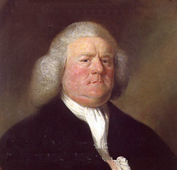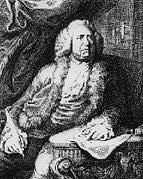

English composer and organist. He began as a choirboy at St.
Paul's Cathedral; later he studied organ and harmony with Maurice Greene, the cathedral organist. His first position was as organist at the Earl of Oxford's chapel in London; he served there until 1736, when he was appointed both
composer to the Chapel Royal and organist at St. Michael's, Comhill. From 1737
he conducted the Music Meeting. Probably during the late 1730s he composed his
first stage work, the masque Peleus and Thetis.  In 1747 his trio sonatas op. 1 were greeted with wide public acclaim, and in 1749 he received the Bachelor and Doctor of Music degrees from Oxford. Two years after Greene's death in 1755
Boyce was appointed Master of the King's Music in his place; in 1758 he was
also named one of the organists of the Chapel Royal. As a result of growing
deafness, in 1764 he was dismissed from his duties at All Hallow's Church, and
he resigned from St. Michael's in 1768. He spent his last years compiling the
3-volume Cathedral Music (publ. 1760, 1768, and 1773), an important collection
of music by Purcell, Gibbons, Blow, and others. Boyce composed seventeen stage works (most for Drury Lane Theatre); other vocal works, including services, anthems, and odes; instrumental music, including eight symphonies op. 2 (London, 1760), twelve overtures (London, 1770), and the Concerto in D minor (Worcester Overture).
In 1747 his trio sonatas op. 1 were greeted with wide public acclaim, and in 1749 he received the Bachelor and Doctor of Music degrees from Oxford. Two years after Greene's death in 1755
Boyce was appointed Master of the King's Music in his place; in 1758 he was
also named one of the organists of the Chapel Royal. As a result of growing
deafness, in 1764 he was dismissed from his duties at All Hallow's Church, and
he resigned from St. Michael's in 1768. He spent his last years compiling the
3-volume Cathedral Music (publ. 1760, 1768, and 1773), an important collection
of music by Purcell, Gibbons, Blow, and others. Boyce composed seventeen stage works (most for Drury Lane Theatre); other vocal works, including services, anthems, and odes; instrumental music, including eight symphonies op. 2 (London, 1760), twelve overtures (London, 1770), and the Concerto in D minor (Worcester Overture).